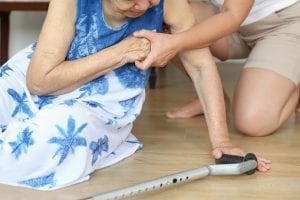 Falls in nursing homes happen far too often and can result in causing serious and life-threatening injuries to elderly residents. Health conditions, such as arthritis, diabetes, Parkinson's disease, and vertigo, are among the leading risk factors that put seniors in danger of falling.
Falls in nursing homes happen far too often and can result in causing serious and life-threatening injuries to elderly residents. Health conditions, such as arthritis, diabetes, Parkinson's disease, and vertigo, are among the leading risk factors that put seniors in danger of falling.
According to research which analyzed death certificates maintained by the National Center for Health Statistics, the death rate due to falls among seniors over age 75 has more than doubled from 2000-2016. In 2000, the death rate was 52 per 100,000 people. In 2016, however, that rate rose to 111 per 100,000 people.
Elizabeth Burns, a health scientist at the Centers for Disease Control and Prevention (CDC) and an author of the study, said the reasons for this increase have yet to be confirmed. However, she points to medications that increase the risk of falling and a higher life expectancy of seniors with conditions that would have been fatal in the past.
In addition, women reportedly are at a greater risk of falling, but men are at a greater risk of dying from a fall.
Can senior falls be prevented?
While seniors are more likely to fall than any other age group, falls are still preventable. According to Dr. Elizabeth Eckstrom, a geriatrician at Oregon Health & Science University, age is the only factor in senior falls that can't be changed.
"Most of the other risks can be mitigated," she said.
Dr. Lewis Lipsitz, a professor of medicine at Harvard Medical School and director of the Marcus Institute for Aging Research at Hebrew Senior Life, suggests incorporating the following methods to prevent seniors from falling:
Getting exercise
Seniors should be getting at least 20 minutes of daily exercise. Lipsitz suggests aerobics, anaerobics, weight lifting (especially for the legs), and tai chi for improved balance.
Research finds that seniors over age 70 who practice tai chi for twice a week for an hour reduced the likelihood of falling by 58 percent. According to Eckstrom, tai chi trains the body to remain stable.
“With a lot of the classic tai chi moves, you make a fairly large step out, or to the side. Or you lean forward, with your trunk. You’re putting yourself in a position of almost falling,” she said.
Be cautious of certain medications
Certain medications can put seniors at a greater risk of falling, especially benzodiazepines and other meds that aid with sleep.
“Metabolism slows in older adults, so toxicity to benzos builds up, which can cause dizziness,” said Eckstrom.
Even non-benzodiazepines, such as Ambien and other sedating medications, can be dangerous for seniors. As an alternative, Eckstrom recommends melatonin, which helps with sleep without dangerous side effects.
Choose safe clothing and accessories
For those who wear glasses, seniors should use single-focus lenses when walking outside. Bifocal or progressive lenses can affect a senior's depth perception, making it more likely to fall.
In addition, shoes should provide stability and functionality. Seniors should avoid slide-in shoes, sandals, and high heels. If a doctor has recommended a cane or walker, it should be used.
Eliminate tripping hazards
A tripping hazard doesn't have to involve noticeable clutter. Falls can be caused by uneven surfaces, rugs, cables, and other small objects.
Staying hydrated
Drinking plenty of water throughout the day can help prevent dizziness or lightheadedness, both of which can put seniors at risk of falling.
Nursing homes have a responsibility to prevent falls
Nursing home staff have a duty to create a safe and accommodating environment for residents. This includes ensuring they receive proper nutrition and hydration, engaging daily activities that involve movement and exercise, and making sure walking areas are well-lit and free of tripping or slipping hazards.
If your loved one was injured in a nursing home due to neglect, it's critical that you discuss this matter with an experienced attorney. The legal team at the Law Office of George S. Johnson, LLC will launch a thorough investigation into the facility where your loved one lives and help you build a strong case against the negligent parties involved. Contact us online today to learn more.
